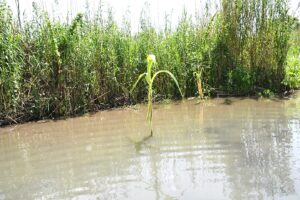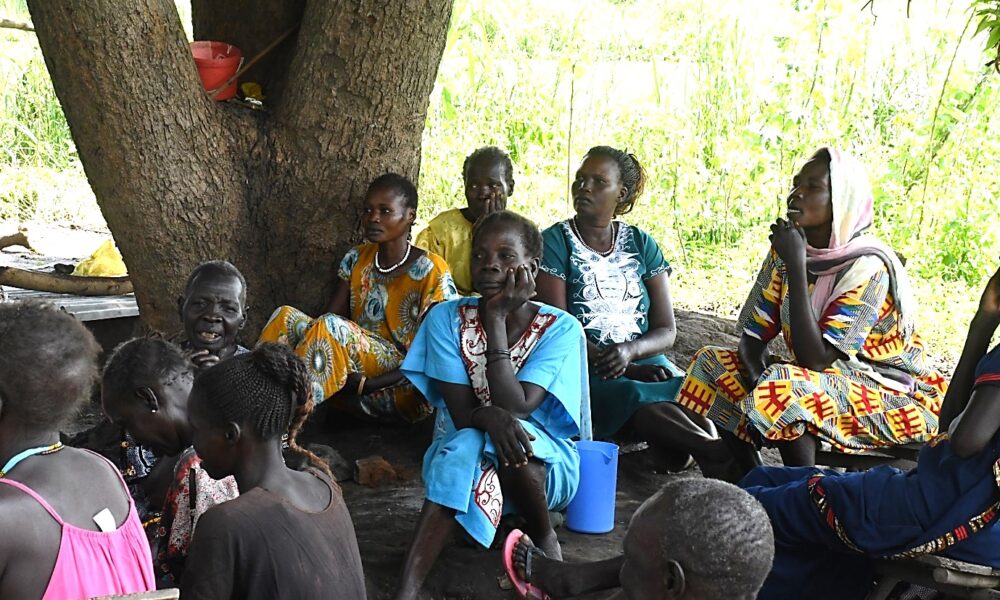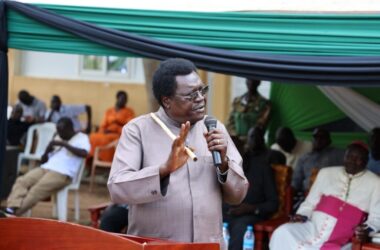By William Madouk
As dusk approaches, residents of Molobur Boma, Jebel Lado Payam, sit in anguish, disappointed, outside hastily assembled shelters and under trees. Bitter expressions of disappointment and losses imprinted across their faces after being violently stripped of the land that sustained them for years.
“We have been facing a serious flood for the last two weeks, but our main issue is that we are being displaced by grabbers,” Lilian Poni, a former resident of Molobur Boma recounts.
“Our houses were located along the main roads, our property including clothes were taken!” Poni exclaims.
“We can not afford to feed our children and when our husbands go for hustling by cutting woods, they are shot at,” she continues her narration of their ordeal.
Molobur Boma of Jebel Lado Payam, Central Equatoria State has become the GROUND ZERO of a notorious land-grabbing scandal that has devastated the area for the last few months. Powerful grabbers (Land Gangs) operating in a mafia-style, have used force and intimidation to seize control of the locals’ ancestral lands.
“Have the government failed us in the fight against these grabbers?” Poni asks in a tone of deep frustration.
With no option, she and her neighbours have been left with no choice but to relocate to a nearby island, abandoning their homes and livelihoods they once had.
Now, the displaced residents find themselves in a dangerous situation, stuck in devastating floods caused by heavy downpours, destroying the shelters they had built.

“We were chased out from our places by the landgrabbers and that prompt us to relocate to this island, but with this flooding, we are now in life-threatening condition,” Gabriel Laku, a Molobur youth leader says.
“It started since March, when we were displaced by landgrabbers and we relocated here, we started the cultivation and now flood destroyed our crops, no food or homes and kids are sick,” he added.
He called on the government to support the affected inhabitants in Jebel Lado Payam.
According to preliminary data, heavy rains caused new flooding, destroying crops and houses and road closures, leaving over 6000 people at risk of hunger.
This has also caused a surge in cases of Malaria, Diarrhea, and Pneumonia among children.
Franko Joseph, chief of Jebel Lado East, Molobur revealed that their places had been demarcated a long time ago, however, a few unscrupulous land gangs instigated re-surveying.
“Grabbers started new demarcation and selling out of the plot, we reported to the government and the authorities did their job and left but it continued until one of my sons was shot and died and up to now no response from the government,” he grieved
“You see along the main road, those people now become the landlords and we the Indigenous become like foreigners in our grandfather’s land,” he noted
He cited that CES governor Augustino Jadalla has promised to resolve the issue of land grabbing, however, no any action been taken yet.
“We are not tribalists! But things are not done procedurally, somebody can come to demarcate and sell it out, does this thing happen anywhere?”
Lado explained that there is precise way of acquiring lands and that is via relevant authorities, “for instance a chief of Benitu or any other place come to Juba and do survey on his own? Is this right?
Executive chief of Jebel Lado East Boma, Charles Laku Wani said, “up to date the governor has not come to visit us nor ask about our condition and I wonder were do Lado Payam belongs to?”
“We need the government to tell us where should we go to. From governor up to commissioner are tribalist … these people did not come to the island on their its land grabbers that forced them.”
Chief Wani called on the authority to solve land grabbing issue as well as provide assistance to flood victims.
He said residents of Jebel Lado Payam, Molobur village of Juba County and surrounding are living in fear of snake bites after reptiles carried by flood waters invaded their homes.
Edward Dion, an MP representing Lado East Payam in the CES legislative assembly, appealed to the government and humanitarian organization to swiftly intervene in rescuing the situation.
“I call on county and state authorities to assist these people because now it become an emergency situation–because people can not stay in the water and the highland where their houses are is inhabited by landgrabbers,”
He said Molobur people are not tribalists, adding when Molobur was demarcated it was surveyed for all South Sudanese.
MP Dion lamented that as the disarmament is ongoing land gangs are left with guns to torment Lado residents.
Mr. Gaism Erasto, director of Lado Payam said that they have reported the catastrophic situation to the commissioner and Relief and Rehabilitation Commission and hopefully, it would reach state authorities.
In early July, the governor of Central Equatoria State Governor, Augustino Jadalla issued a stern warning against grabbers in Molobur village East of Jebel Lado Payam, Juba County.
Gen. Jadalla put land gangs on notice during his tour of Molobur area, which had been a scene of land-grabbing.
In a crackdown on grabbers in April, over forty people were arrested allegedly involved in a land grab.
At least thirteen individuals out of the stated number, including SSPDF officers, got sentenced to two months in prison and fined 250,000 SSP each for land grabbing and malicious damage.
This followed protests from the Chiefs of Molobor Boma of Jebel Lado Payam, Juba County, who reported displacement of over 3,000 households as the alleged grabbers terrorized the area.
Last year, the former commissioner of Juba County pointed an accusing finger at high-profile government officials and high-ranking security officers of being leading land grabbers in Juba City.
Engineer Charles Wani Joseph said land grabbing has been carried out by cartels, starting way back after the signing of the 2005 comprehensive peace agreement.
“An organized group supported by high-ranking security officers and senior people in the government is behind these cases of land grabbing in Juba,” he disclosed.




